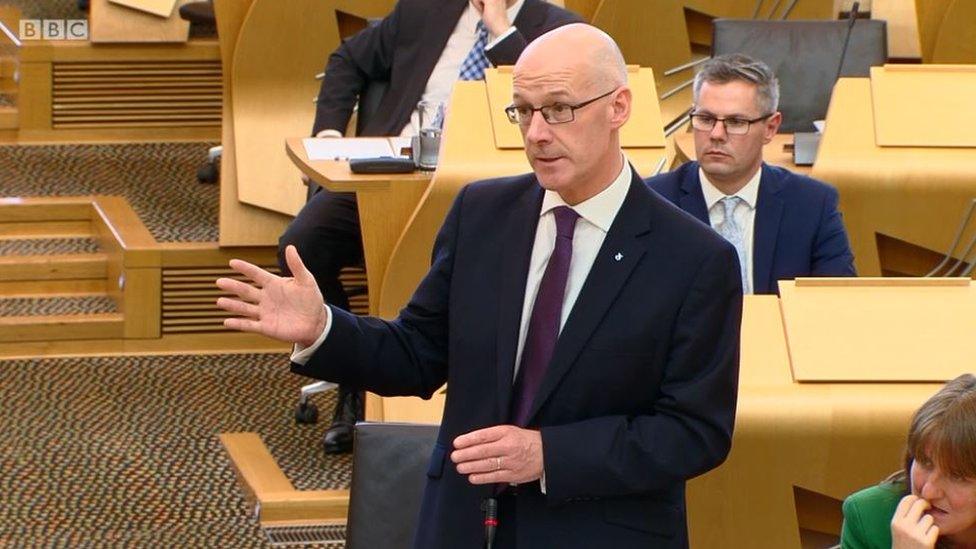Poorer students' education allowance drops by £1.6m
- Published

Allowance payments to young people from poorer homes to help them stay in education have fallen by £1.6m in a year, new figures indicate.
Scottish government statistics show a total of £23m was handed out in 2017/18, down from £24.6m in 2017/18.
More than 29,000 teenagers were given the allowance in 2017/18, down 8% from the previous year.
However, the proportion of teenagers from the most deprived areas given the allowance rose slightly.
Overcoming financial barriers
The figure went up to 37.2%, up from 36.8% in 2016/17 - although the number of recipients in these areas fell by 805 to 10,810.
Education Maintenance Allowance (EMA) is for people aged 16-19 from lower income households to help them overcome financial barriers to staying in school, college or undertaking an activity agreement.
Most payments went to school pupils (64%) with colleges taking 31% and activity agreements making up 5%.
Just over a quarter (27%) of Scotland's school pupils aged 16 or over were given at least one payment, as were 31% of full-time college students aged 16-19.
Average individual payments over the year increased by £11 to £788 in 2017/18.

Analysis by Jamie McIvor, BBC Scotland education correspondent
Educational Maintenance Allowance is available to eligible people aged 16 to 19 who have reached school leaving age. It is worth £30 a week.
The main reason for its existence is to try to ensure that a young person should never drop out of education because of the family income or pressure to "go out and earn a living".
It is designed for people studying for qualifications such as Highers - not more advanced further education courses such as HNDs. Most of the people helped by allowances are still at school although some will be at college.
To qualify for the allowance, households with one dependent child must be earning £24,421 per year or less. Households with more than one dependent child must be earning £26,884 or less, before tax.
The allowance is currently paid in addition to Child Benefit and other benefits. Young people on Job Seekers' Allowance or on government supported training schemes are not eligible for the cash.
There are likely to be a number of possible reasons for the drop in the uptake.
Possible explanations include the overall number of young people and the bursary packages available to learners in college.
Another question may be about whether the allowance is sufficiently well publicised or understood. Are some people who might benefit from it not applying for it?
It would certainly seem hard to argue that many people aged under 18 are dropping out of education on purely financial grounds.
Certainly it is now unusual for someone aged under 18 to leave full time education unless they have been lucky enough to secure a job. When a young person is not in education, employment or training there is often a complicated back story.


John Swinney said the figures were "encouraging"
Education Secretary, John Swinney, said the statistics were "encouraging".
He said: "EMA is one of the measures available to offer financial support, alongside college bursaries, for example.
"It is particularly encouraging to see that this year the proportion of young people receiving EMA from our most deprived areas has continued to increase and is now up eight percentage points since 2006/07 to reach 37% of overall recipients of EMA."
He added that the government was committed to removing barriers to success for all young people.
Mr Swinney said: "The gap between the most and least deprived communities for young people entering work, training or further study is half what it was in 2009/10, a higher proportion of students from our most deprived areas successfully completed substantial college courses last year and a record number of students from the most disadvantaged areas successfully gained a place at university last year.
"These early results are encouraging but we know there is more to do to raise attainment which is why we remain committed to initiatives, like Education Maintenance Allowance, to remove barriers to education and give all our young people an equal chance to succeed."